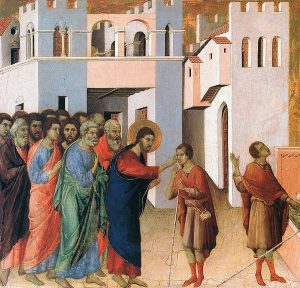Thoughts on Sunday’s Lessons for March 22, 2020
First Reading: 1 Samuel 16:1-13
So far during Lent, our readings have taken us through thoughts on temptation and sin, faith and trust, and physical and spiritual thirst. This Sunday’s lectionary reflects on light and sight: What do we see, and how do we see it?

Jesus opens the Eyes of a Man born Blind (1308-1311), tempera on wood painting by Duccio di Buoninsegna (1255-1319). Altarpiece of the Siena Cathedral, Italy, now in the National Gallery in London. (Click image to enlarge.)
First we read the Hebrew Bible account of God’s growing dissatisfaction with Saul, the first king of Israel. God directs the prophet and judge Samuel to look for the new king that God has chosen among the sons of Jesse the Bethlehemite. It takes a while for Samuel to work his way down through Jesse’s seven older sons before he reaches David, the youngest, thought such an unlikely candidate that he had been left out in the fields to watch the sheep. God saw the spirit in David that the others could not see, and David becomes king.
Psalm: Psalm 23
It isn’t easy for Christians to hear the comforting verses of the 23rd Psalm without imagining the face of Jesus in the Good Shepherd. Indeed, John’s Gospel has Jesus telling his disciples, “I am the good shepherd. The good shepherd lays down his life for the sheep.” Ancient tradition, though, holds that King David himself wrote these beloved verses, speaking of a subject that he would have known well as a boyhood shepherd. In fact, the ancient rabbis in exile most likely wrote this song, thinking of an earthly Messiah who would restore Jerusalem and the Temple. No matter how we read it, we all can rest in the joy of knowing that God’s rod and staff comfort us, and that God’s goodness and mercy follow us all the days of our lives.
Second Reading: Ephesians 5:8-14
The short letter to the church in Ephesus was probably actually written by a follower in Paul’s name a few decades after his death. The full epistle contains some problems for modern Christians who take it out of its historical and cultural context. It appears to sanction slavery, for example: and it firmly puts women in their place as “subject” to their husbands. There are no such issues with Sunday’s short reading, though. It offers a poetic view of light against darkness, perhaps echoing John’s vision of Jesus as the light shining in the darkness, and pointing us toward today’s Gospel about the man born blind.
Gospel: John 9:1-41
Speaking of harsh ideas that linger from ancient times, the sad notion that blindness and other disabilities reflect God’s punishment for one’s sins or the sins of one’s parents has been hard to overcome, despite Jesus’ emphasis that God does no such thing. Rather, the very words that the man born blind utters upon his healing make the case for grace, not punishment, as we hear them in one of Christianity’s most beloved hymns: “I once was lost, but now am found … Was blind, but now I see.”
